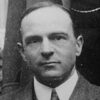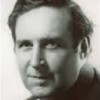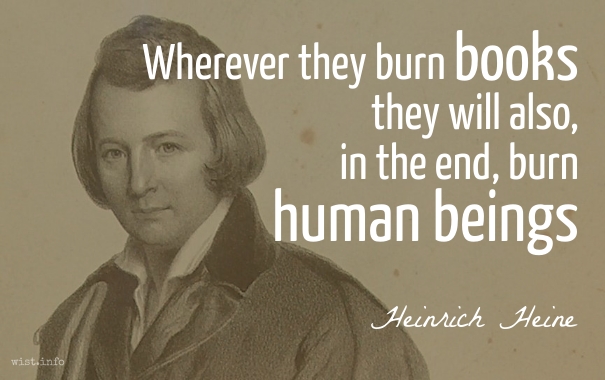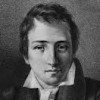Every time you get a censor, you get a fool, and worse yet a knave, pretending to be a guardian of morality, while acting as a guardian of class greed.
Upton Sinclair (1878-1968) American writer, journalist, activist, politician
Money Writes!, ch. 22 “The Bookleggers” (1927)
(Source)
Self-quoted in "Poor Me and Pure Boston," The Nation (1927-06-29)
Quotations about:
censor
Note not all quotations have been tagged, so Search may find additional quotes on this topic.
To whom do you award the right to decide which speech is harmful, or who is the harmful speaker? Or to determine in advance what are the harmful consequences going to be that we know enough about in advance to prevent? To whom would you give this job? To whom are you going to award the task of being the censor? Isn’t a famous old story that the man who has to read all the pornography, in order to decide what’s fit to be passed and what is fit not to be, is the man most likely to become debauched? Did you hear any speaker in the opposition to this motion, eloquent as one of them was, to whom you would delegate the task of deciding for you what you could read? To whom you would give the job of deciding for you — relieve you of the responsibility of hearing what you might have to hear? Do you know anyone? Hands up. Do you know anyone to whom you’d give this job? Does anyone have a nominee?
It is as unreasonable in any one Man or Set of Men to expect to be pleas’d with every thing that is printed, as to think that nobody ought to be pleas’d but themselves.
Benjamin Franklin (1706-1790) American statesman, scientist, philosopher, aphorist
“Apology for Printers,” Philadelphia Gazette (1731-06-10)
(Source)
It is the people with secret attractions to various temptations who busy themselves most with removing those temptations from other people; really they are defending themselves under the pretext of defending others, because at heart they fear their own weakness.
Ernest Jones (1879-1958) Welsh neurologist and psychoanalyst
“Criticisms of Psycho-Analytic Treatment,” Speech, Chicago Neurological and Chicago Medical Societies (18 Jan 1911)
Originally published in the American Journal of the Medical Sciences (Jul 1911). Reprinted in Papers on Psycho-Analysis, ch. 12 (1918).
A censor is a man who has read about Joshua and forgotten about Canute. The censor believes that he can hold back the mighty traffic of life with a tin whistle and a raised right hand. For, after all, it is life with which he quarrels.
It is not the idea as such which the censor attacks, whether it be heresy or radicalism or obscenity. He attacks the circulation of the idea among the classes which in his judgment are not to be trusted with the idea.
Walter Lippmann (1889-1974) American journalist and author
Men of Destiny, ch. 8 “The Nature of the Battle Over Censorship,” sec. 2 (1927)
(Source)
I am inordinately proud these days of the quill, for it has shown itself, historically, to be the hypodermic which inoculates men and keeps the germ of freedom always in circulation, so that there are individuals in every time in every land who are the carriers, the Typhoid Mary’s, capable of infecting others by mere contact and example. These persons are feared by every tyrant — who shows his fear by burning the books and destroying the individuals.
Next to enjoying ourselves, the next greatest pleasure consists in preventing others from enjoying themselves, or, more generally, in the acquisition of power. Consequently those who live under the dominion of Puritanism become exceedingly desirous of power.
Obscenity is whatever happens to shock some elderly and ignorant magistrate.
Bertrand Russell (1872-1970) English mathematician and philosopher
Look, “What They Are Saying” (1954-02-23)
(Source)
This column was a regular feature quoting notable comments by notable people. The actual source of the quotation, presumably made around this time, is unknown.
Wherever they burn books they will also, in the end, burn human beings.
[Dort, wo man Bücher verbrennt, verbrennt man auch am Ende Menschen.]
Heinrich Heine (1797-1856) German poet and critic
Almansor: A Tragedy, l. 245 (1823)
Alt trans:
- "Where they burn books, at the end they also burn people."
- "Where they burn books, they will also burn people."
- "It is there, where they burn books, that eventually they burn people."
- "Where they burn books, so too will they in the end burn human beings."
- "Where they burn books, they also burn people."
- "Them that begin by burning books, end by burning men."
- "Wherever books are burned, sooner or later men are also burned."
I am really mortified to be told that, in the United States of America, a fact like this can become a subject of enquiry, and of criminal enquiry too, as an offence against religion: that a question about the sale of a book can be carried before the civil magistrate. Is this then our freedom of religion? And are we to have a Censor whose imprimatur shall say what books may be sold, and what we may buy? And who is thus to dogmatise religious opinions for our citizens? Whose foot is to be the measure to which ours are all to be cut or stretched? Is a Priest to be our Inquisitor, or shall a layman, simple as ourselves, set up his reason as the rule for what we are to read, & what we must believe? It is an insult to our citizens to question whether they are rational beings or not; and blasphemy against religion to suppose it cannot stand the test of truth and reason. If M. de Becourt’s book be false in it’s facts, disprove them; if false in it’s reasoning, refute it. but, for god’s sake, let us freely hear both sides, if we chuse.
Thomas Jefferson (1743-1826) American political philosopher, polymath, statesman, US President (1801-09)
Letter to Nicolas G. Dufief (19 Apr 1814)
(Source)












